Unit 2 Last weekend 复习课件(共39张PPT)
文档属性
| 名称 | Unit 2 Last weekend 复习课件(共39张PPT) |
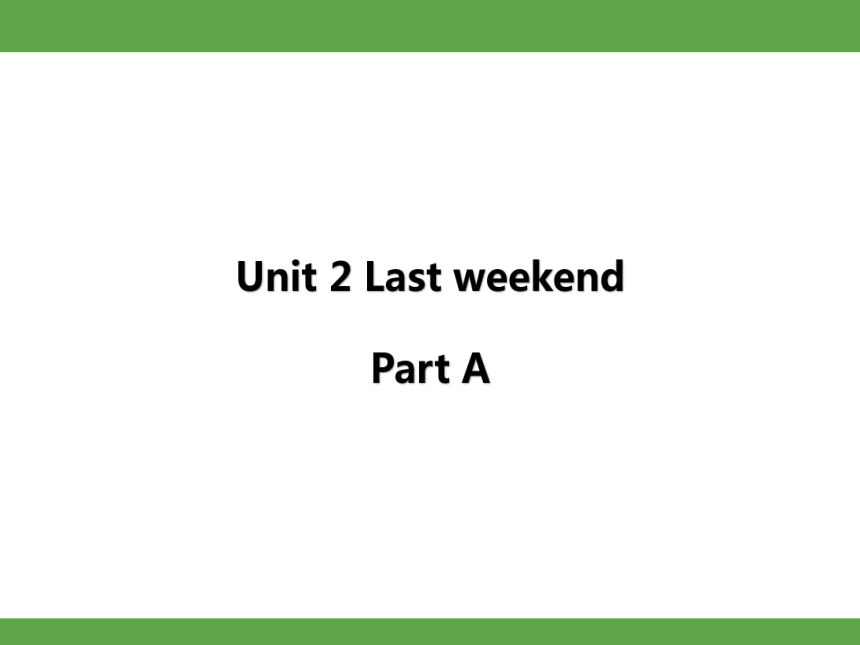
|
|
| 格式 | pptx | ||
| 文件大小 | 574.6KB | ||
| 资源类型 | 教案 | ||
| 版本资源 | 人教版(PEP) | ||
| 科目 | 英语 | ||
| 更新时间 | 2025-03-23 00:00:00 | ||
图片预览

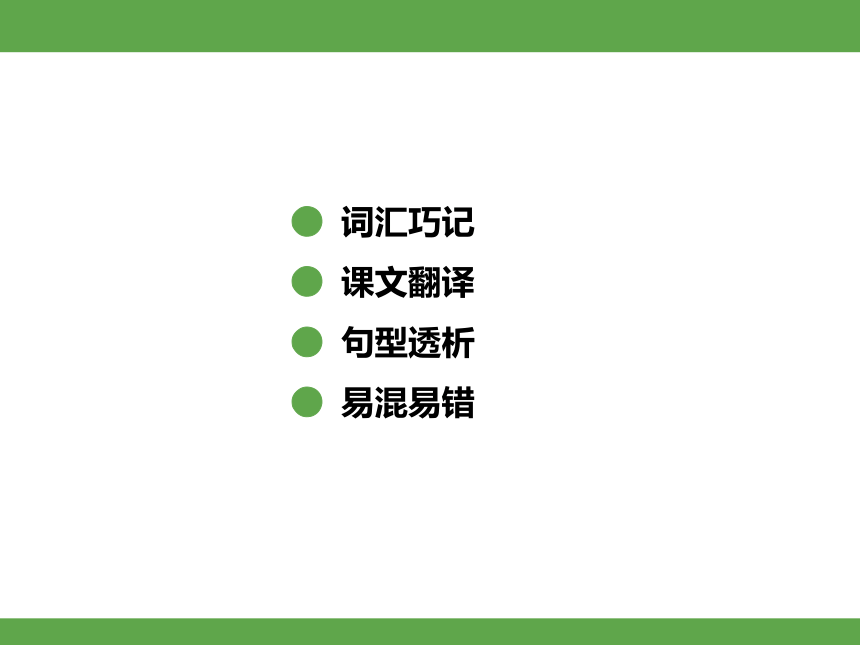
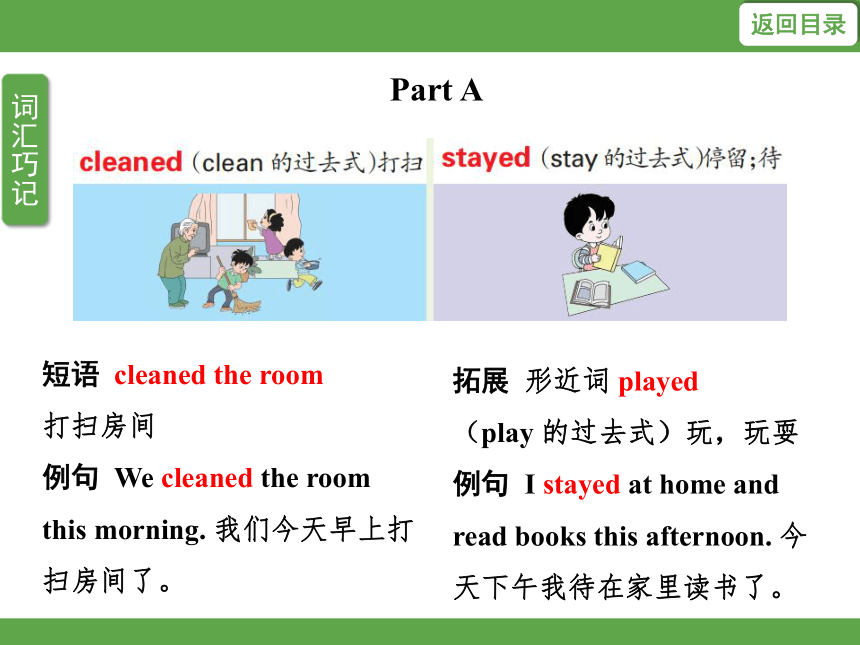

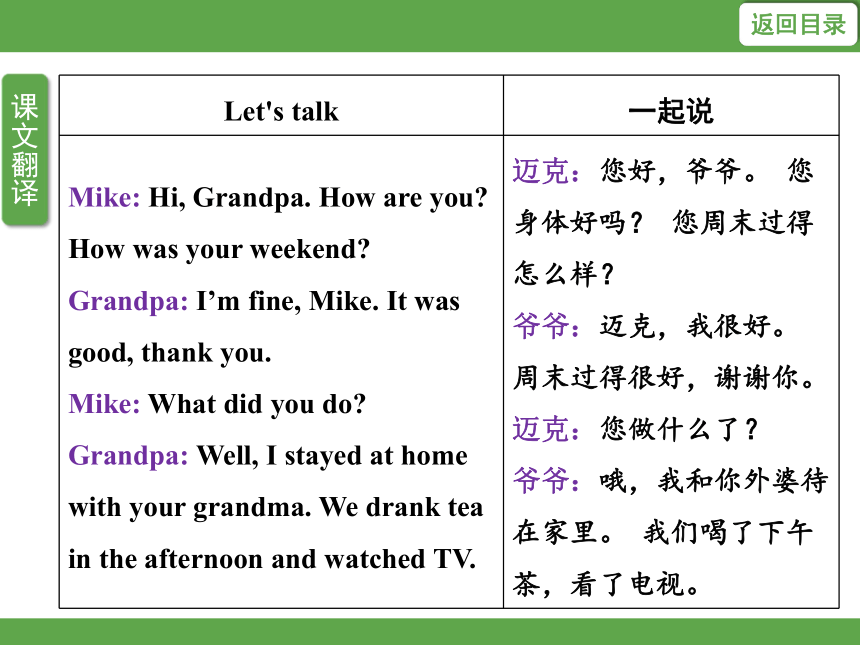
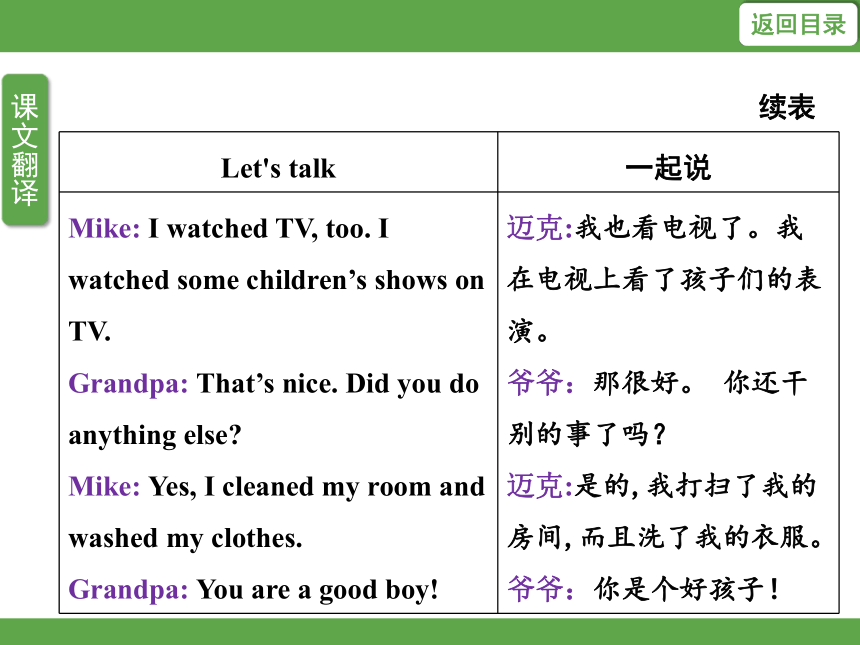
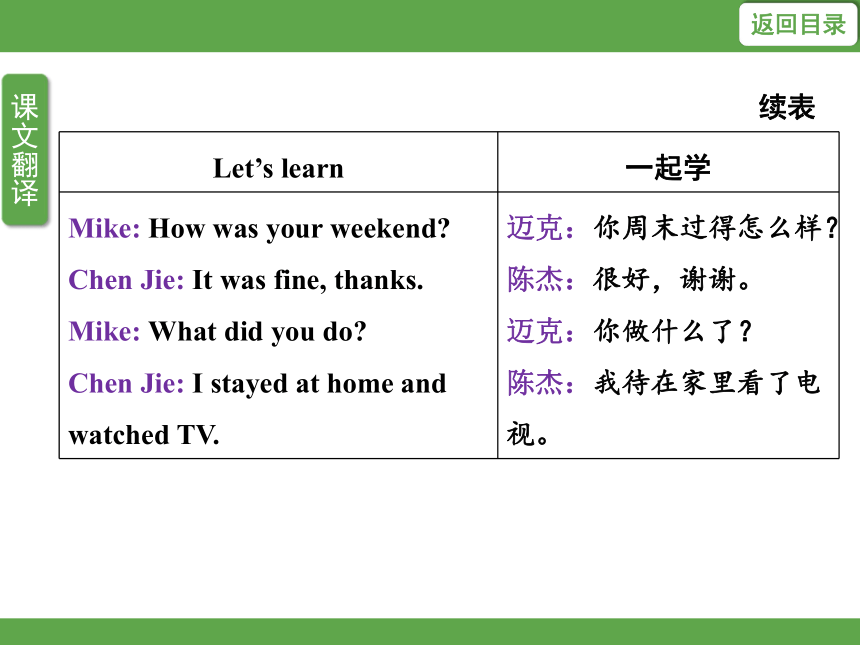
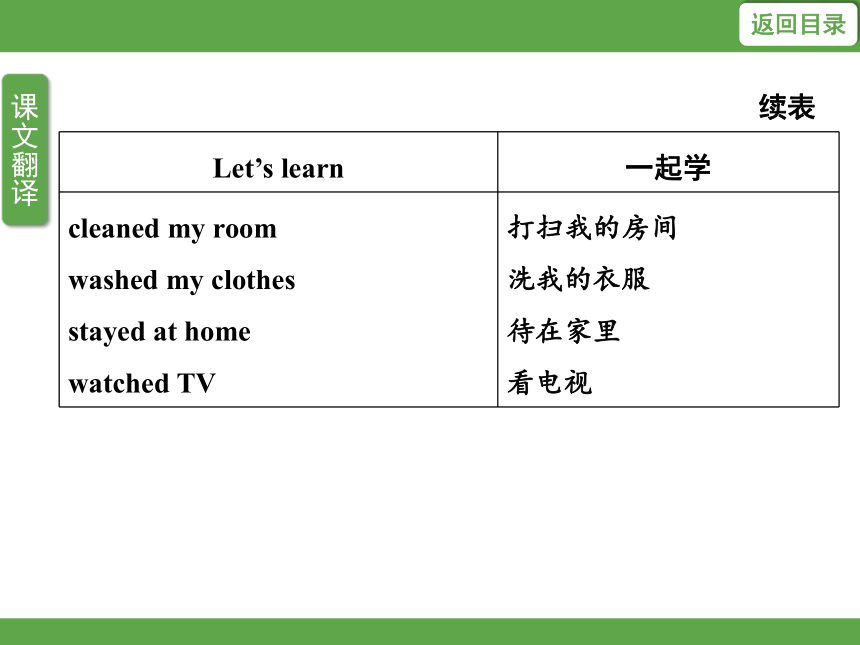
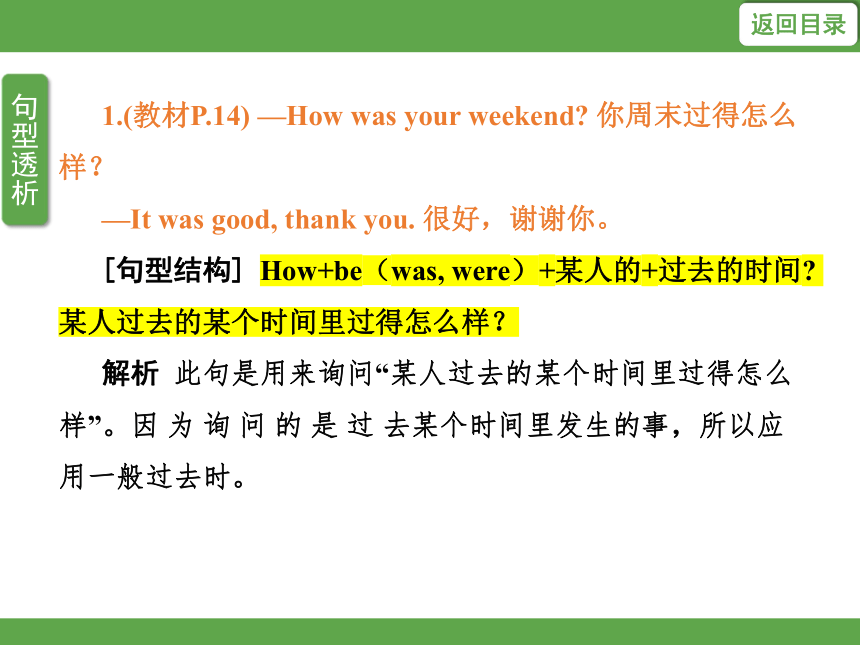
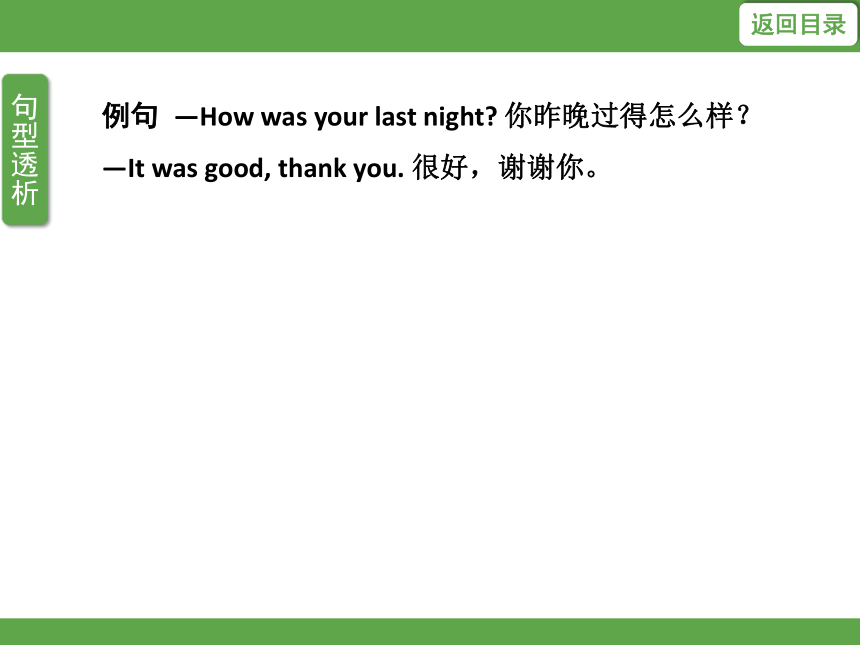
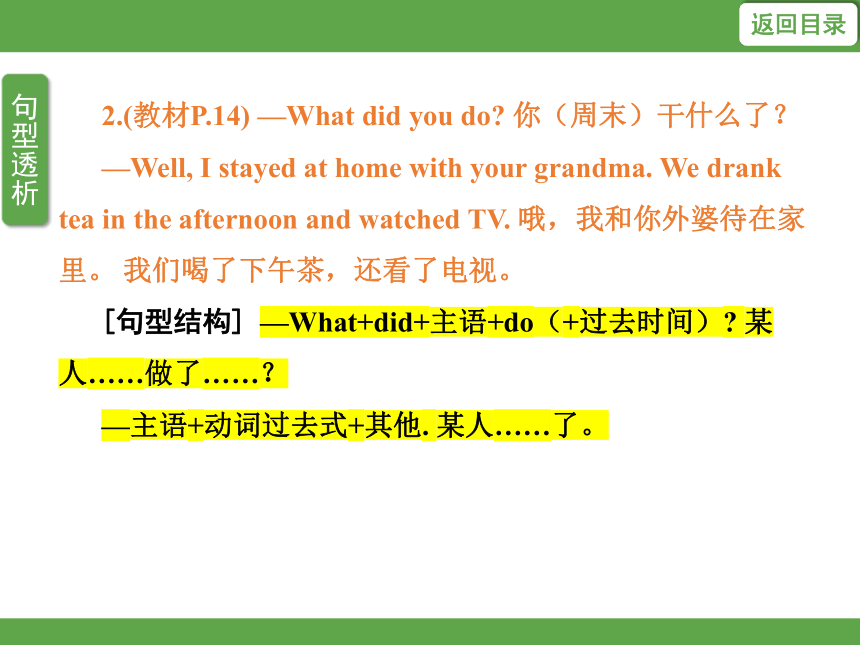
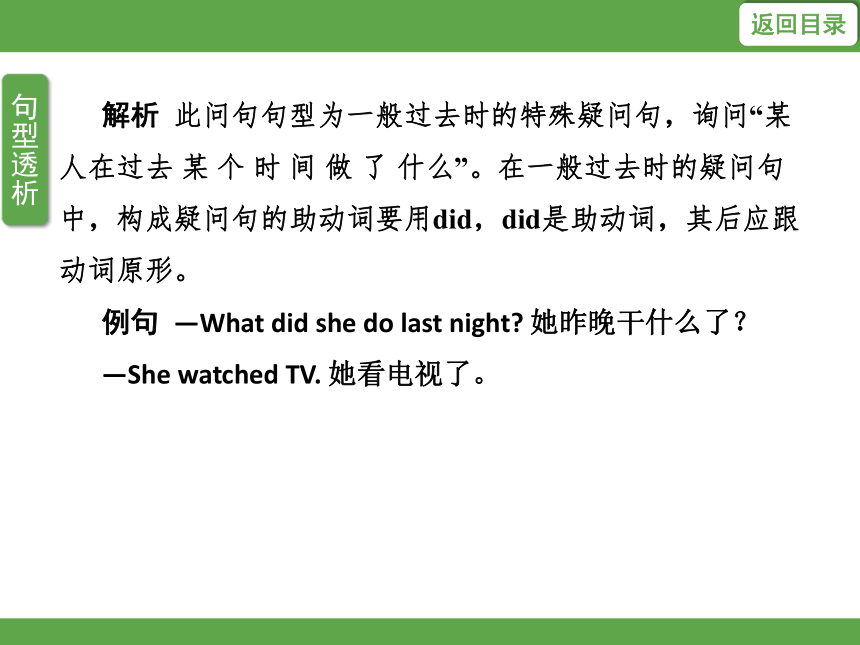
文档简介
(共39张PPT)
Unit 2 Last weekend
Part A
● 词汇巧记
● 课文翻译
● 句型透析
● 易混易错
短语 cleaned the room
打扫房间
例句 We cleaned the room
this morning. 我们今天早上打扫房间了。
拓展 形近词 played
(play 的过去式)玩,玩耍
例句 I stayed at home and read books this afternoon. 今
天下午我待在家里读书了。
Part A
例句 Lucy washed her clothes last Sunday.露西上周日洗她的衣服了。
Let's talk 一起说
Mike: Hi, Grandpa. How are you How was your weekend Grandpa: I’m fine, Mike. It was good, thank you. Mike: What did you do Grandpa: Well, I stayed at home with your grandma. We drank tea in the afternoon and watched TV. 迈克:您好,爷爷。 您身体好吗? 您周末过得怎么样?
爷爷:迈克,我很好。 周末过得很好,谢谢你。
迈克:您做什么了?
爷爷:哦,我和你外婆待在家里。 我们喝了下午茶,看了电视。
Let's talk 一起说
Mike: I watched TV, too. I watched some children’s shows on TV. Grandpa: That’s nice. Did you do anything else Mike: Yes, I cleaned my room and washed my clothes. Grandpa: You are a good boy! 迈克:我也看电视了。我在电视上看了孩子们的表演。
爷爷:那很好。 你还干别的事了吗?
迈克:是的,我打扫了我的房间,而且洗了我的衣服。
爷爷:你是个好孩子!
续表
Let’s learn 一起学
Mike: How was your weekend Chen Jie: It was fine, thanks. Mike: What did you do Chen Jie: I stayed at home and watched TV. 迈克:你周末过得怎么样?
陈杰:很好,谢谢。
迈克:你做什么了?
陈杰:我待在家里看了电视。
续表
Let’s learn 一起学
cleaned my room washed my clothes stayed at home watched TV 打扫我的房间
洗我的衣服
待在家里
看电视
续表
1.(教材P.14) —How was your weekend 你周末过得怎么样?
—It was good, thank you. 很好,谢谢你。
[句型结构] How+be(was, were)+某人的+过去的时间 某人过去的某个时间里过得怎么样?
解析 此句是用来询问“某人过去的某个时间里过得怎么样”。因 为 询 问 的 是 过 去某个时间里发生的事,所以应用一般过去时。
例句 —How was your last night 你昨晚过得怎么样?
—It was good, thank you. 很好,谢谢你。
2.(教材P.14) —What did you do 你(周末)干什么了?
—Well, I stayed at home with your grandma. We drank tea in the afternoon and watched TV. 哦,我和你外婆待在家里。 我们喝了下午茶,还看了电视。
[句型结构] —What+did+主语+do(+过去时间) 某人……做了……?
—主语+动词过去式+其他. 某人……了。
解析 此问句句型为一般过去时的特殊疑问句,询问“某人在过去 某 个 时 间 做 了 什么”。在一般过去时的疑问句中,构成疑问句的助动词要用did,did是助动词,其后应跟动词原形。
例句 —What did she do last night 她昨晚干什么了?
—She watched TV. 她看电视了。
3.(教材P.14) —Did you do anything else 你还做了其他什么事吗?
—Yes, I cleaned my room and washed my clothes. 是的,我打扫了房间,还洗了衣服。
[句型结构] —Did +主语+动词(短语)原形+过去的时间 某人在过去某个时间是否做了某事?
—Yes, 主语+did. 是的,某人做了某事。
—No, 主语+didn’t. 不,某人没做某事。
解析 此问句是由Did引导的一般过去时的一般疑问句,用于询问某人过去是否做了某事。 did为助动词,后跟动词原形。
例句 —Did you wash your clothes yesterday 你昨天洗衣服了吗?
—Yes, I washed my clothes. 是的,我洗了衣服。
1. 一词多义的show
(1)作名词,意为“演出;节目”。
TV show 电视节目 children’s show 儿童节目
(2)作名词,意为“展览;展览会”。
art show 艺术展 fashion show 时装展 car show 车展
(3)作动词,意为“展示;给……看”,“给某人看某物”可以用show sth. to sb.或show sb. sth.。
例句 Show me your hand. = Show your hand to me. 给我看看你的手。
2. 一词多义的clean
(1)作动词,意为“打扫;擦”。
clean the room 打扫房间 clean the window 擦窗户
(2)作形容词,意为“干净的”。
例 句 The room is clean now. 房间现在干净了。
3. 不一样的“看”
watch意为“观看”,我们学过的单词look,see,read都有“看”的含义,我们一起来看看它们的区别吧。
(1)watch强调“专注地看”,有欣赏的意味,常用于看电视、看球赛等。
例句 He’s watching a football match on TV. 他正在电视上看足球比赛。
My little sister is watching TV. 我的妹妹正在看电视。
(2)look强调看的动作,但不一定能看见。 表示“看某人/物”后面要加at。
例句 Look at the blackboard. 看黑板。 Look at me. 看我。
(3)see意为“看见”,强调看的结果。
例句 How many girls can you see 你能看见多少个女孩?
Can you see a red apple 你能看到一个红苹果吗?
(4)read常用于看书、看报等。
例句 He’s reading a newspaper. 他正在看报纸。
She likes reading books. 她喜欢看书。
Part B
Unit 2 Last weekend
● 词汇巧记
● 课文翻译
● 句型透析
● 易混易错
● 写作指导
短语 had a cold 感冒
例句 I had a cold last night.
我昨晚感冒了。
拓展 近义词
nap 打盹;小睡(尤指日间)
例句 I stayed at home and
slept all weekend. 整个周末我都待在家里睡觉了。
Part B
短语 read books 读书
例句 I read books in the
classroom yesterday. 我昨
天在教室里读书。
拓展 形近词 law 法律
例句 I saw many stars last
night. 昨天晚上我看到了好多星星。
短语 drank a cup of water
喝一杯水
例句 I just drank a cup of water.
刚刚我喝了一杯水。
拓展 同类词 today 今天
例句 I played football with my friends yesterday. 昨天我和我的朋友们踢足球了。
拓展 反义词
after 在……之后
例句 I went to school before eight o’clock. 八点之前我就去上学了。
短语 fix sth.修复某物
例句 My father fixed my
broken bike yesterday. 我
爸爸昨天修了我的坏自行车。
短语 stay in the hotel
住在旅馆
例句 The hotel is very clean. 这家旅馆很干净。
Let's talk 一起说
John: Hey, Amy. Let’s go to the bookstore. I want to buy the new film magazine. Amy: Oh, I read it last weekend. John: Was it interesting Amy: Yes, it talked about a lot of new films. What did you do last weekend Did you see a film 约翰:嘿,艾米。 我们去书店吧。 我想买期新的电影杂志。
艾米:哦,我上周末看过了。
约翰:新杂志有意思吗?
艾米:是的。新杂志评论了好多新电影。 你上周末干什么了?你看电影了吗?
Let's talk 一起说
John: No, I had a cold. I stayed at home all weekend and slept. Amy: Oh, I’m sorry. I’m happy you feel better now. John: Thanks. Let’s go by bus. It’s faster than walking. 约翰:没有,我感冒了。整个周末我都待在家里睡觉。
艾米:哦,抱歉。 我很高兴你现在感觉好多了。
约翰:谢谢。我们坐公共汽车去吧。它(坐车)比走路快。
续表
Read and write 读一读,写一写
Wu Binbin and his family stayed at the Holiday Hotel. It was not a happy time. Dear Customer, Thank you for staying in our hotel. How was your stay Please circle: Good Average Bad 吴斌斌和他的家人待在假日旅馆。那不是一段愉快的时光。
尊敬的顾客:
感谢您入住我们的旅馆。 您入住的感觉如何? 请圈出您的感受:
好 一般 不好
续表
Comments 评论
Dear Sir, Our weekend at your hotel was bad. Ourroom was big but everything was very old. Our friend Robin cleaned our room and fixed a broken chair. 尊敬的先生:
我们周末在你们旅馆感觉不好。 我们的房间很大但是每样东西都很老旧。 我们的朋友罗宾打扫了我们的房间并且修理了一把坏椅子。
续表
Comments 评论
My mother wanted to read a book but the lamp was too small. My dad got some hamburgers from the hotel kitchen, but they were cold and tasted bad. 我的妈妈想读书但是台灯太小。 我的爸爸从旅馆的厨房里拿了一些汉堡,但是它们又凉又难吃。
续表
Comments 评论
I wanted to watch TV but the TV didn’t work. The people in Room 301 listened to loud music. I didn’t sleep all night. I’m sorry, but we didn’t enjoy our stay very much. Wu Binbin and family 我想看电视但是电视机是坏的。 住在301房间的客人听音乐的声音太大。 我一晚上没睡。
很抱歉,但是我们确实在这儿待得不愉快。
吴斌斌和家人
续表
1.(教材P.16) I want to buy the new film magazine.我想买期新的电影杂志。
[句型结构] 主语+want(s) to+动词原形+其他. 某人想要做某事。
解析 此句型意为“某人想要做某事”。其中want意为“想要”,其后可跟物,表示“想要某物”;也可跟动词不定式(to do),表示“想要做某事”。
例句 I want to read a storybook. 我想读故事书。
Mike wants to see a film. 迈克想要看电影。
2.(教材P.16) —What did you do last weekend Didyou see a film 你上周末干什么了? 你看电影了吗?
—No, I had a cold. I stayed at home all weekend and slept. 没有,我感冒了。整个周末我都待在家里睡觉。
[句型结构] —What+did+主语+动词(短语)原形+过去的时间 Did+主语+动词(短语)原形+其他 某人……做了什么?某人……了吗?
—No, +一般过去时的陈述句. 不,……
解析 此问句是一般过去时的特殊疑问句和一般疑问句。 答语在作出否定回答后,又进一步说明了他所做的事情。
例句 —What did your sister do last night Did she wash her clothes 你的妹妹昨晚做什么了? 她洗她的衣服了吗?
—No, she did her homework. 不,她做了她的家庭作业。
—What did Tom do last Saturday Did he play football 汤姆上周六做什么了? 他踢足球了吗?
—No, he cleaned his room. 不,他打扫了他的房间。
一词多义的have
1. 患病;得病 例 句 She had a cold. 她感冒了。
2. 有
例句 I have a car. 我有一辆车。
Lily has three pencils. 莉莉有三支铅笔。
3. 吃;喝
例句 It’s time to have lunch. 该吃午饭了。
I usually have milk and bread for breakfast. 我早餐经常喝牛奶吃面包。
4. 举行;进行
例句 We will have an English party tomorrow. 我们明天将举行一场英语晚会。
5. 经历
例句 We had a good time in Beijing. 我们在北京玩得很开心。
6. 固定短语,如:
have a look 看一看 have a try 试一试 have to 不得不
如何写“上周末活动内容”小作文
思维导图
经典好文
My Last Weekend
I had a busy weekend.
I visited my grandparents on Saturday. I helped them clean the room. And I cooked lunch with my grandma. After lunch, we watched Animal World on TV for half an hour. Then we all had a nap. My grandparents were very happy. On Sunday morning, I did my homework and saw a film with my best friend. On Sunday afternoon, I washed my clothes and went shopping with my mum.
That was a busy weekend, but I enjoyed it very much.
Unit 2 Last weekend
Part A
● 词汇巧记
● 课文翻译
● 句型透析
● 易混易错
短语 cleaned the room
打扫房间
例句 We cleaned the room
this morning. 我们今天早上打扫房间了。
拓展 形近词 played
(play 的过去式)玩,玩耍
例句 I stayed at home and read books this afternoon. 今
天下午我待在家里读书了。
Part A
例句 Lucy washed her clothes last Sunday.露西上周日洗她的衣服了。
Let's talk 一起说
Mike: Hi, Grandpa. How are you How was your weekend Grandpa: I’m fine, Mike. It was good, thank you. Mike: What did you do Grandpa: Well, I stayed at home with your grandma. We drank tea in the afternoon and watched TV. 迈克:您好,爷爷。 您身体好吗? 您周末过得怎么样?
爷爷:迈克,我很好。 周末过得很好,谢谢你。
迈克:您做什么了?
爷爷:哦,我和你外婆待在家里。 我们喝了下午茶,看了电视。
Let's talk 一起说
Mike: I watched TV, too. I watched some children’s shows on TV. Grandpa: That’s nice. Did you do anything else Mike: Yes, I cleaned my room and washed my clothes. Grandpa: You are a good boy! 迈克:我也看电视了。我在电视上看了孩子们的表演。
爷爷:那很好。 你还干别的事了吗?
迈克:是的,我打扫了我的房间,而且洗了我的衣服。
爷爷:你是个好孩子!
续表
Let’s learn 一起学
Mike: How was your weekend Chen Jie: It was fine, thanks. Mike: What did you do Chen Jie: I stayed at home and watched TV. 迈克:你周末过得怎么样?
陈杰:很好,谢谢。
迈克:你做什么了?
陈杰:我待在家里看了电视。
续表
Let’s learn 一起学
cleaned my room washed my clothes stayed at home watched TV 打扫我的房间
洗我的衣服
待在家里
看电视
续表
1.(教材P.14) —How was your weekend 你周末过得怎么样?
—It was good, thank you. 很好,谢谢你。
[句型结构] How+be(was, were)+某人的+过去的时间 某人过去的某个时间里过得怎么样?
解析 此句是用来询问“某人过去的某个时间里过得怎么样”。因 为 询 问 的 是 过 去某个时间里发生的事,所以应用一般过去时。
例句 —How was your last night 你昨晚过得怎么样?
—It was good, thank you. 很好,谢谢你。
2.(教材P.14) —What did you do 你(周末)干什么了?
—Well, I stayed at home with your grandma. We drank tea in the afternoon and watched TV. 哦,我和你外婆待在家里。 我们喝了下午茶,还看了电视。
[句型结构] —What+did+主语+do(+过去时间) 某人……做了……?
—主语+动词过去式+其他. 某人……了。
解析 此问句句型为一般过去时的特殊疑问句,询问“某人在过去 某 个 时 间 做 了 什么”。在一般过去时的疑问句中,构成疑问句的助动词要用did,did是助动词,其后应跟动词原形。
例句 —What did she do last night 她昨晚干什么了?
—She watched TV. 她看电视了。
3.(教材P.14) —Did you do anything else 你还做了其他什么事吗?
—Yes, I cleaned my room and washed my clothes. 是的,我打扫了房间,还洗了衣服。
[句型结构] —Did +主语+动词(短语)原形+过去的时间 某人在过去某个时间是否做了某事?
—Yes, 主语+did. 是的,某人做了某事。
—No, 主语+didn’t. 不,某人没做某事。
解析 此问句是由Did引导的一般过去时的一般疑问句,用于询问某人过去是否做了某事。 did为助动词,后跟动词原形。
例句 —Did you wash your clothes yesterday 你昨天洗衣服了吗?
—Yes, I washed my clothes. 是的,我洗了衣服。
1. 一词多义的show
(1)作名词,意为“演出;节目”。
TV show 电视节目 children’s show 儿童节目
(2)作名词,意为“展览;展览会”。
art show 艺术展 fashion show 时装展 car show 车展
(3)作动词,意为“展示;给……看”,“给某人看某物”可以用show sth. to sb.或show sb. sth.。
例句 Show me your hand. = Show your hand to me. 给我看看你的手。
2. 一词多义的clean
(1)作动词,意为“打扫;擦”。
clean the room 打扫房间 clean the window 擦窗户
(2)作形容词,意为“干净的”。
例 句 The room is clean now. 房间现在干净了。
3. 不一样的“看”
watch意为“观看”,我们学过的单词look,see,read都有“看”的含义,我们一起来看看它们的区别吧。
(1)watch强调“专注地看”,有欣赏的意味,常用于看电视、看球赛等。
例句 He’s watching a football match on TV. 他正在电视上看足球比赛。
My little sister is watching TV. 我的妹妹正在看电视。
(2)look强调看的动作,但不一定能看见。 表示“看某人/物”后面要加at。
例句 Look at the blackboard. 看黑板。 Look at me. 看我。
(3)see意为“看见”,强调看的结果。
例句 How many girls can you see 你能看见多少个女孩?
Can you see a red apple 你能看到一个红苹果吗?
(4)read常用于看书、看报等。
例句 He’s reading a newspaper. 他正在看报纸。
She likes reading books. 她喜欢看书。
Part B
Unit 2 Last weekend
● 词汇巧记
● 课文翻译
● 句型透析
● 易混易错
● 写作指导
短语 had a cold 感冒
例句 I had a cold last night.
我昨晚感冒了。
拓展 近义词
nap 打盹;小睡(尤指日间)
例句 I stayed at home and
slept all weekend. 整个周末我都待在家里睡觉了。
Part B
短语 read books 读书
例句 I read books in the
classroom yesterday. 我昨
天在教室里读书。
拓展 形近词 law 法律
例句 I saw many stars last
night. 昨天晚上我看到了好多星星。
短语 drank a cup of water
喝一杯水
例句 I just drank a cup of water.
刚刚我喝了一杯水。
拓展 同类词 today 今天
例句 I played football with my friends yesterday. 昨天我和我的朋友们踢足球了。
拓展 反义词
after 在……之后
例句 I went to school before eight o’clock. 八点之前我就去上学了。
短语 fix sth.修复某物
例句 My father fixed my
broken bike yesterday. 我
爸爸昨天修了我的坏自行车。
短语 stay in the hotel
住在旅馆
例句 The hotel is very clean. 这家旅馆很干净。
Let's talk 一起说
John: Hey, Amy. Let’s go to the bookstore. I want to buy the new film magazine. Amy: Oh, I read it last weekend. John: Was it interesting Amy: Yes, it talked about a lot of new films. What did you do last weekend Did you see a film 约翰:嘿,艾米。 我们去书店吧。 我想买期新的电影杂志。
艾米:哦,我上周末看过了。
约翰:新杂志有意思吗?
艾米:是的。新杂志评论了好多新电影。 你上周末干什么了?你看电影了吗?
Let's talk 一起说
John: No, I had a cold. I stayed at home all weekend and slept. Amy: Oh, I’m sorry. I’m happy you feel better now. John: Thanks. Let’s go by bus. It’s faster than walking. 约翰:没有,我感冒了。整个周末我都待在家里睡觉。
艾米:哦,抱歉。 我很高兴你现在感觉好多了。
约翰:谢谢。我们坐公共汽车去吧。它(坐车)比走路快。
续表
Read and write 读一读,写一写
Wu Binbin and his family stayed at the Holiday Hotel. It was not a happy time. Dear Customer, Thank you for staying in our hotel. How was your stay Please circle: Good Average Bad 吴斌斌和他的家人待在假日旅馆。那不是一段愉快的时光。
尊敬的顾客:
感谢您入住我们的旅馆。 您入住的感觉如何? 请圈出您的感受:
好 一般 不好
续表
Comments 评论
Dear Sir, Our weekend at your hotel was bad. Ourroom was big but everything was very old. Our friend Robin cleaned our room and fixed a broken chair. 尊敬的先生:
我们周末在你们旅馆感觉不好。 我们的房间很大但是每样东西都很老旧。 我们的朋友罗宾打扫了我们的房间并且修理了一把坏椅子。
续表
Comments 评论
My mother wanted to read a book but the lamp was too small. My dad got some hamburgers from the hotel kitchen, but they were cold and tasted bad. 我的妈妈想读书但是台灯太小。 我的爸爸从旅馆的厨房里拿了一些汉堡,但是它们又凉又难吃。
续表
Comments 评论
I wanted to watch TV but the TV didn’t work. The people in Room 301 listened to loud music. I didn’t sleep all night. I’m sorry, but we didn’t enjoy our stay very much. Wu Binbin and family 我想看电视但是电视机是坏的。 住在301房间的客人听音乐的声音太大。 我一晚上没睡。
很抱歉,但是我们确实在这儿待得不愉快。
吴斌斌和家人
续表
1.(教材P.16) I want to buy the new film magazine.我想买期新的电影杂志。
[句型结构] 主语+want(s) to+动词原形+其他. 某人想要做某事。
解析 此句型意为“某人想要做某事”。其中want意为“想要”,其后可跟物,表示“想要某物”;也可跟动词不定式(to do),表示“想要做某事”。
例句 I want to read a storybook. 我想读故事书。
Mike wants to see a film. 迈克想要看电影。
2.(教材P.16) —What did you do last weekend Didyou see a film 你上周末干什么了? 你看电影了吗?
—No, I had a cold. I stayed at home all weekend and slept. 没有,我感冒了。整个周末我都待在家里睡觉。
[句型结构] —What+did+主语+动词(短语)原形+过去的时间 Did+主语+动词(短语)原形+其他 某人……做了什么?某人……了吗?
—No, +一般过去时的陈述句. 不,……
解析 此问句是一般过去时的特殊疑问句和一般疑问句。 答语在作出否定回答后,又进一步说明了他所做的事情。
例句 —What did your sister do last night Did she wash her clothes 你的妹妹昨晚做什么了? 她洗她的衣服了吗?
—No, she did her homework. 不,她做了她的家庭作业。
—What did Tom do last Saturday Did he play football 汤姆上周六做什么了? 他踢足球了吗?
—No, he cleaned his room. 不,他打扫了他的房间。
一词多义的have
1. 患病;得病 例 句 She had a cold. 她感冒了。
2. 有
例句 I have a car. 我有一辆车。
Lily has three pencils. 莉莉有三支铅笔。
3. 吃;喝
例句 It’s time to have lunch. 该吃午饭了。
I usually have milk and bread for breakfast. 我早餐经常喝牛奶吃面包。
4. 举行;进行
例句 We will have an English party tomorrow. 我们明天将举行一场英语晚会。
5. 经历
例句 We had a good time in Beijing. 我们在北京玩得很开心。
6. 固定短语,如:
have a look 看一看 have a try 试一试 have to 不得不
如何写“上周末活动内容”小作文
思维导图
经典好文
My Last Weekend
I had a busy weekend.
I visited my grandparents on Saturday. I helped them clean the room. And I cooked lunch with my grandma. After lunch, we watched Animal World on TV for half an hour. Then we all had a nap. My grandparents were very happy. On Sunday morning, I did my homework and saw a film with my best friend. On Sunday afternoon, I washed my clothes and went shopping with my mum.
That was a busy weekend, but I enjoyed it very much.
